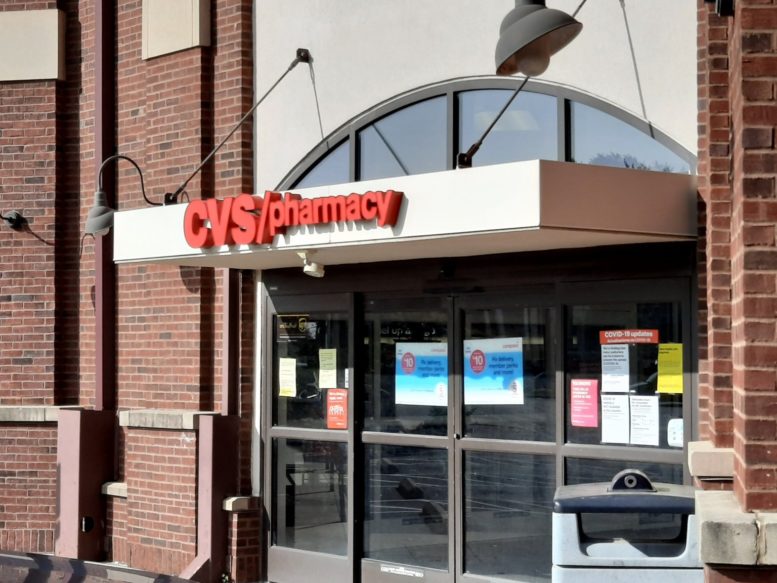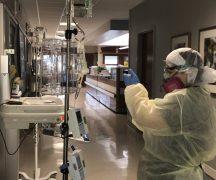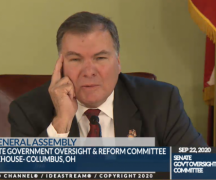It’s a practice long complained of in Ohio.
CVS Health and other massive corporations often use their pharmacy middleman subsidiaries to force people to get the most expensive class of drugs from the businesses’ own mail-order pharmacies. Some call the practice “patient steering.”
CVS and companies such as UnitedHealth and ExpressScripts/Cigna say the arrangements save patients money. But some patients, oncologists and other health providers say it threatens lives.
Now the U.S. Supreme Court is poised to weigh in. In a little more than a month, it will hear arguments in a California case in which AIDS patients are claiming the practice discriminates against them.
Known as “pharmacy benefit managers” or PBMs, the middlemen work with insurance companies or government programs like Medicare and Medicaid to facilitate prescription-drug transactions. They negotiate rebates with drugmakers, decide what drugs are covered and they determine how much to reimburse pharmacies that dispense drugs as part of their health plans.
But the function that’s in dispute in the California case is how PBMs structure their pharmacy networks.
Each of the big three PBMs is affiliated with a major insurer and each is part of a corporation that is among the 13 largest in the United States. And the combined PBMs are estimated to control well over 70% of the pharmacy-middleman marketplace.
They’re also frequently in direct competition with the retail pharmacies whose reimbursements they control. CVS owns the nation’s largest retail chain and each of the big three owns a mail-order pharmacy for “specialty drugs” — the most expensive class of medicines, which can cost upward of $100,000 a year.
Increasingly, the big-three PBMs have been saying they won’t cover super-expensive specialty drugs if patients get them at their oncology centers or their AIDS clinics. It’s increasingly the case that the only way PBMs will cover them is if patients get them through the mail from a PBM-owned pharmacy.
Critics say the point is to pad profits, but the PBMs maintain that they do this to help their customers.
“To keep costs down, plan designs offered by pharmacy benefit managers often impose the most restrictions on ‘specialty’ drugs,” CVS said in its petition asking the Supreme Court to take up the case. “These medications have special shipping, administration, or storage requirements; treat rare conditions; or are very expensive.”
It added, “Pharmacy benefit managers often control the disproportionate costs and complexities of specialty drugs by contracting with specialty pharmacies that have expertise in the ‘unique handling, storage, and dispensing’ requirements of these medications. Increasingly, pharmacy benefit managers rely on specialty pharmacies that deliver by mail.”
However, many patients complain that especially when they have complex conditions that require equally complex drug regimens, mail-order service is vastly inferior to the services they get in-person from pharmacy professionals.
In 2018, Elvin Weir, a now-deceased cancer patient, described to The Columbus Dispatch how late or improperly filled mail-order cancer prescriptions had often delayed the rest of his treatment as his disease worsened. And officials at oncology centers said the arrangement disrupts the collaboration between their pharmacists and oncologists treating conditions that can be not only complex, but also change rapidly.
The plaintiffs in the original California case made much the same argument.
“For people living with HIV/AIDS, strict lifetime adherence to antiretroviral therapies (ART), consisting of complex combinations of pharmaceuticals consumed daily, is vitally important, and can be literally a life-or-death matter,” the AIDS Healthcare Foundation wrote in a friend-of-the-court brief.
“For people living with HIV/AIDS, so-called specialty pharmacies and pharmacists that focus on HIV/AIDS and in-person treatment provide demonstrably superior care than do mail-order pharmacies and retail pharmacies,” it added. “Coercing people living with HIV/AIDS into using only mail-order pharmacies is thus guaranteeing inferior care and worse health outcomes, and is disability discrimination by both intent and impact.”
A panel of the 9th U.S. Court of Appeals last December said that among its mistakes, the lower court in the CVS case didn’t acknowledge that face-to-face interactions with pharmacists were part of the benefits to which plan members are entitled.
The Ninth Circuit ruled that CVS’s mail-order policy might discriminate against the disabled because it “burdens HIV/AIDS patients differently because of their unique pharmaceutical needs. Specifically, they claim that changes in medication to treat the continual mutation of the virus requires pharmacists to review all of an HIV/AIDS patient’s medications for side effects and adverse drug interactions, a benefit they no longer receive under the program.”
In its appeal to the Supreme Court, CVS is disputing the plaintiffs’ legal argument that the mail-order policy violates the law because it has a “disparate impact.”
In other words, the AIDS-afflicted plaintiffs are saying that even if on its face the policy applies equally to everybody, it’s still illegal discrimination if it has a discriminatory effect against part of a protected group: the disabled. CVS, on the other hand, is arguing that so long as its policies aren’t intentionally discriminatory, they’re OK.
The law puts “federal-funding recipients on notice that intentional discrimination is illegal,” its petition says. “Schools cannot discipline students with attention-deficit disorder more harshly on that basis. Towns cannot target group homes for individuals with disabilities with uniquely onerous zoning requirements. Employers cannot refuse to hire someone solely because she is in a wheelchair. And health plans and anyone else subject to (federal health care laws) cannot facially exclude patients with disabilities simply because they have disabilities.”
“Courts do not need to rewrite (the law) and insert a nonexistent disparate-impact standard to accomplish Congress’ goals,” CVS argued.
The health care company noted that appellate courts have issued differing opinions in the matter. That, presumably, is the dispute the Supreme Court hopes to settle by taking up the case.
Oral arguments are slated for Dec. 7.
***
Also from Ohio Capital Journal:
Congressional maps get first public scrutiny
Because of the warp-speed introduction of GOP congressional redistricting maps in House and Senate committees yesterday, Thursday’s public testimony was mostly harsh criticism of procedure, though the day wasn’t without specific map criticisms.
Dissection of the maps introduced yesterday were similar to those given during the legislative redistricting process, and to those given of maps that are currently in place in the state.
“In my lifetime, which is just 31 years, I’ve almost never lived in a state that didn’t gerrymander my ability to vote, and that’s been Ohio,” said Jasmine Henderson, a Dayton resident and director of policy and social impact for the Ohio Women’s Alliance. READ MORE
“You’re fired.” Dem gov. candidate Cranley promises to clean house at PUCO
Democratic gubernatorial hopeful John Cranley is promising a scorched earth response to Ohio’s HB 6 scandal: fire every member of the public utilities commission. The former Cincinnati mayor contends a clean slate is the only way to restore trust in the Pubic Utilities Commission of Ohio, or PUCO, and he has additional reforms in mind for nominating new commissioners.
Cranley cites state law granting the governor authority to remove commissioners for issues like inefficiency, neglect of duty or malfeasance in office. He also nods to former Gov. Dick Celeste who took the same drastic action when he took office.
“We have to clean house,” Cranley said. “This is the biggest scandal in the history of the state. It’s time to clean house. There may be good individuals, good human beings, but anyone associated with Mike DeWine and HB 6, has got to go. They have got to go.” READ MORE





